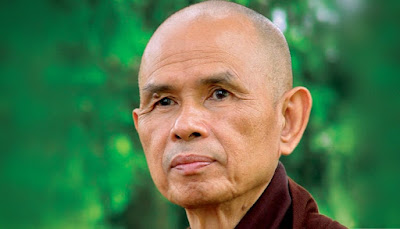We talked about him for a long time. Thầy — that's an affectionate nickname for Thich Nhat Hanh and means "Teacher" — is or was the founder and spiritual leader of the tradition Debbie follows. When I mentioned back in 2013 that she was ordained into a lay order, that meant that she had formally received the Fourteen Mindfulness Trainings which ordained her into Thầy's Order of Interbeing.
She talked about times she had been privileged to hear Thay speak in person. I added that I had seen and heard him in person exactly once, because he was there on the occasion of Debbie's ordination, formally officiating. Then afterwards he gave a dharma talk and took questions for a long time from the group as a whole. Some of the questions came from pretty far out in left field, but Thay answered them all: carefully, respectfully, simply, and compassionately. He was remarkably skillful. Debbie said at one point, "I truly believe he was the Buddha for our day."
Later she said that all week she had been contemplating one of Thay's poems, "No coming, No going," and that it had helped her come to peace with his death. She added that even though he is physically dead as of today, she can feel his presence around her through his teachings. So in one way she was sad, of course, but in another way not. She was in any event profoundly moved.After a long while we began to talk about the rest of her week. It has been a tough one. She works as an occupational health nurse, for a clinic system where close to 10% of the staff are sick at home with COVID-19, even as cases among the public in her area are spiking. She has to connect with every staff member who is out sick, and check on their progress, so the clinics can figure out how to reassign staff to maintain their coverage. And she told me, not only was the workload heavy but the emotional weight of it was just as heavy, because so many of her colleagues are sick and suffering, or have family members who are sick and suffering. One was a grandmother, who contracted the disease from her grandson; the grandmother was weathering it well enough, all things considered, but the grandson was in the hospital and intubated. Debbie asked if the grandmother would accept prayer for her grandson, and the grandmother grasped at the offer gratefully. By the time that phone call finished, Debbie added, both she and the grandmother were weeping openly.
She added one other thing, which did not surprise me a bit. One by one, her coworkers have been talking to the president of the clinic system, telling him how grateful they are for Debbie's unstinting help and deep compassion. She told me this only by the way, only to say how grateful she was that she had been able to help them so much. She explicitly rejected the idea that it reflected anything special on her. But — as I say — I wasn't a bit surprised. Debbie's compassion really is almost boundless. It's one of the things I love about her. She would rebuke me sharply for putting it this way, but she is a bit of a saint.
So she talked. I listened, reflected back to her what I heard her saying, and tried to console where I could. I remarked that hard weeks like this are even harder when you can't meet anyone in person, to offer a hug or even hold a hand. (The thought came to me because there were so many times during our call that I just wanted to hold her.) She agreed, and pretty clearly understood what I was saying. When we wrapped up the call, she looked straight into the camera and said:
"You know I love you."
I nodded and replied:
"I love you too. I will always love you."
And I will. Of course I knew it and she knew it anyway. But sometimes it's nice to say the words out loud.





No comments:
Post a Comment